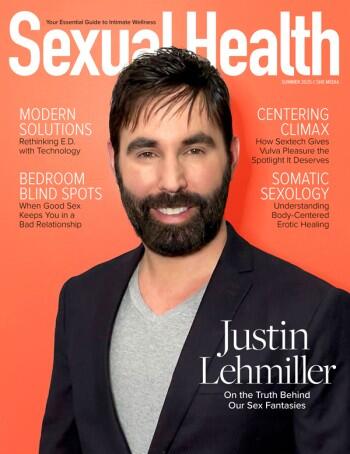For decades, mainstream media has portrayed eroticism through a very narrow lens. Whether in the form of a hardcore porno, a magazine ad for adult toys, or a cover illustration for a romance novel, persons depicted in a sexual manner have historically and largely been thin, young and able-bodied. As society has grown to be more accepting of recognizing and even celebrating diversity, the adult industry too has made changes in its visual marketing to reflect this cultural shift. Nowadays, you can see a stunning array of models and erotic actors across different ethnic groups, sizes, ages and physical ability levels.
Unfortunately, the same can’t exactly be said for representation in erotic products themselves. Most sex toys and accessories aim to make sex better or more interesting for an idealized general public while certain demographics are left struggling to have sex at all. There are a myriad of factors that can make physical intimacy difficult to achieve successfully or with satisfaction, such as old age, mobility issues, fatness and height differences between partners, to name only a few. These groups, which are certainly marginalized but by no means a minority, are left having to figure things out on their own while those with lesser, minor or zero sexual hindrances receive undue preference in the adult retail marketplace.
Sex-positioning enhancers can assist couples in achieving the ideal angle for intimacy regardless of what limitations may be at play.
The solution to many of these woes lies not within sex “toys” as we’ve come to think of them, but positioning props. Sex-positioning enhancers can assist couples in achieving the ideal angle for intimacy regardless of what limitations may be at play. Positioning shapes alleviate a wide range of sexual barriers; they can position bodies in a way that creates a tighter fit and allows for deeper penetration, act as a fulcrum for easier thrusting, and elevate the pelvis to mitigate sore necks while performing oral, thereby increasing stamina, too.
When I first started working at Liberator, I thought the aforementioned benefits were mostly marketing fluff, a list of proposed uses meant to sell fancy novelty cushions to those with money to burn. “Why not just put a regular pillow under your ass when you need a little boost?” was my stance on the matter. It wasn’t until I read a fan-submitted story for Liberator’s “Lusty Lit” contest that the purpose (or more accurately, one of the many purposes) of positioning aids became apparent to me.
The story, aptly titled “Perfectly Positioned,” begins with the narrator absentmindedly telling her husband, who uses a wheelchair, that she misses a particular sex act that the couple are unable to carry out together. This admission sparks a discussion on fantasies and fulfillment, which leads the pair to purchase a Liberator positioning product and enables them to put their previously discussed fantasies into action.
When I finished reading this contest entry, things finally clicked for me. I was then able to recognize that my able-bodied privilege had been clouding my judgment and that while I have the luxury of achieving sexual intimacy without any aid, others may require special angles and support found in erotic wedges and sex furniture to accomplish what I can without.
When it comes to sexual intimacy aids, the line between “erotic accessory” and “medical treatment” can sometimes get blurry, but sex wedges differ from the purely medical retail category by marrying fun and function. Not only do they resolve common physical intimacy issues, but they also allow for more creativity in the bedroom, a welcome advantage that any type of consumer can appreciate.
While there is, of course, nothing wrong with wanting to enhance people’s sex lives, there needs to be a greater effort made toward making sex more accessible in the first place for consumers who don’t fit the mold of what we’ve been conditioned to believe is “normal.” By diversifying your product offerings to include sexual enhancement products that can double as sexual aids, you not only diversify your customer base but you make the world a more sex-positive place.
Jen Schwartz is a copy writer for Liberator.








